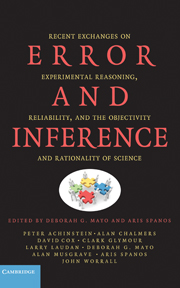 Error and Inference
Error and Inference Published online by Cambridge University Press: 29 January 2010
Introduction
In any sophisticated system of inquiry, we expect to find several features intimately tied to questions of error and error avoidance. Above all, we want a system (1) that produces relatively few erroneous beliefs (without resort to the skeptical gimmick of avoiding error by refusing to believe anything) and (2) that, when it does make mistakes, commits errors that tend to be of the less egregious kind than of the more egregious kind (supposing that we can identify some error types as more serious than others). Finally, (3) we want to have mechanisms in place with the capacity to eventually identify the errors that we have made and to tell us how to correct for them. In short, we want to be able to reduce errors, to distribute those errors that do occur according to our preferences, and to have a self-correction device for identifying and revising our erroneous beliefs. This is, of course, an unabashedly Peircean view of the nature of inquiry, although one need not be (as I confess to being) a card-carrying pragmatist to find it congenial.
Most of the papers in this volume deal with the problem of error as it arises in the context of scientific research. That approach is fair enough because most of us are philosophers of science.
To save this book to your Kindle, first ensure [email protected] is added to your Approved Personal Document E-mail List under your Personal Document Settings on the Manage Your Content and Devices page of your Amazon account. Then enter the ‘name’ part of your Kindle email address below. Find out more about saving to your Kindle.
Note you can select to save to either the @free.kindle.com or @kindle.com variations. ‘@free.kindle.com’ emails are free but can only be saved to your device when it is connected to wi-fi. ‘@kindle.com’ emails can be delivered even when you are not connected to wi-fi, but note that service fees apply.
Find out more about the Kindle Personal Document Service.
To save content items to your account, please confirm that you agree to abide by our usage policies. If this is the first time you use this feature, you will be asked to authorise Cambridge Core to connect with your account. Find out more about saving content to Dropbox.
To save content items to your account, please confirm that you agree to abide by our usage policies. If this is the first time you use this feature, you will be asked to authorise Cambridge Core to connect with your account. Find out more about saving content to Google Drive.